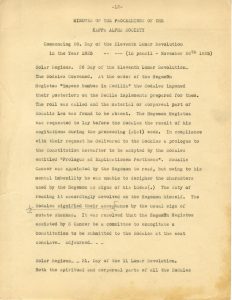Student Attends Event on Aging
January 22, 2019
Hosted in Las Vegas, the Annual Academy of Anti-Aging Medicine’s World Congress conference brings the world’s leading minds together to discuss progress in extending the human lifespan and preventing chronic diseases. This year, the conference had various titans from the healthcare industry, including scientists, physicians, entrepreneurs and problem-solvers.
The Director of the Longevity institute Dr. Valter Longo and Naveen Jain took the stage. Longo described how the Fasting Mimicking Diet, a diet consisting of low carbs, low protein and high fat, can reverse the effects of aging, reduce body-fat, increase lean muscle mass and combat diseases like cancer and multiple sclerosis.
These effects are proposed to be so effective that if a person were to follow this diet for three times a year for 20 years, one’s biological clock would be turned back by up to 16 years.
Jain delivered a keynote address which challenging the very basis of nutrition and diet. Jain wrote a book on how humanity can colonize the moon.
Recently, Jain founded a new company, Viome, with the humble goal of “making chronic disease optional.” Viome scans intestines to determine its specific microenvironment, e.g. bacteria species diversity and gene expression.
Jain highlighted how the benefit of food is dependent on the gut’s microenvironment.
He provided the example of how pomegranate juice is theoretically a powerful antioxidant. He then went onto explain that if a person lacks a certain enzyme in your gut, which many people do, then they are just paying for “expensive urine” that may even be harmful.
In short, by uncovering the specific issues people have in their intestines, people are able to understand which foods raise their risk of developing chronic diseases.
Following the larger keynote presentations, the conference broke out into several mini-conferences covering different niches of healthcare.
One of these mini-conferences, the MedTech Impact on Wellness, focused on applications of technology to healthcare to improve patient health and lower health costs.
The topics ranged from mobile health apps to policy reform to AI and robotics implementation.
One-on-one interviews with Vice President of Marketing for Jenny Craig Steven Bellach and Dr. Andrew Wiesenthal revealed their thoughts regarding health tech innovation.
Bellach discussed how digital health technology improves obesity management.
He describes that when people try to lose weight, accountability is a crucial issue. Accountability refers to the extent to which another agent is holding the weight loser responsible for their weight loss.
Most people suffering from obesity start out with a “do it yourself” approach that usually fails.
Then, they transition into group support initiatives, such as weight watchers.
After, they pivot to professional medical advice through dieticians, nutritionist, or physicians. Finally, some move to surgical intervention.
As one moves farther down the spectrum of accountability, the likelihood of weight loss success increases, but at the expense of rising costs.
Bellach argued that digital health solutions can be introduced at early stages of the weight loss journey to improve accountability, reduce costs and enhance the weight loss success rate.
Specifically, interactive wearables can be used to collect real time data which can then be communicated to a physician to enhance accountability.
Bellach highlighted how this real-time data analysis has been shown to boost long-term retention, improve compliance and enhance outcomes.
In addition, these wearables provide the opportunity for providers to pinpoint trends, identify best practices and set alerts to intervene at critical time periods.
Wiesenthal built off Bellach’s analysis by drawing a connection between wearables and electronic health records (EHR’s).
Having spearheaded the development of Kaiser Permanente’s EHR in the 80’s and 90’s, Wiesenthal has a wealth of knowledge about technology and healthcare.
He agreed with Bellach that wearables allow for real-time data analysis, improvement of self-care and a better understanding of system efficacy.
However, he cautions that these wearables must first be synced with an EHR and then have the data refined before it meets a physician’s eyes.
Wiesenthal admits that wearables are by no means a panacea for the health system’s issues due to the existence of several obstacles blocking their widespread implementation.
Namely, the lack of interoperability between EHRs severely limits the value of wearables and a consensus on how data is specified must be achieved before society is able to fully leverage the power of wearables.
Concurrent with the speakers, an exhibition hall showcased over 400 functional health companies. These companies sported all types of technologies that may have the potential to extend the lifespan and improve quality of life.
From physician-certified massage chairs to plasma beam-assisted liposuction gadgets to nootropic supplements, there was a wide range of widgets across all domains of health.
These inventions were created by successful experts in their fields. When asked to give career advice, Jain responded: “Life is not about having passion. Passion is for losers.
Unless you have an obsession with something, that is not what your calling is. Find something that you’re willing to wake up at 4 a.m. for. Find something you’re willing to die for.”







